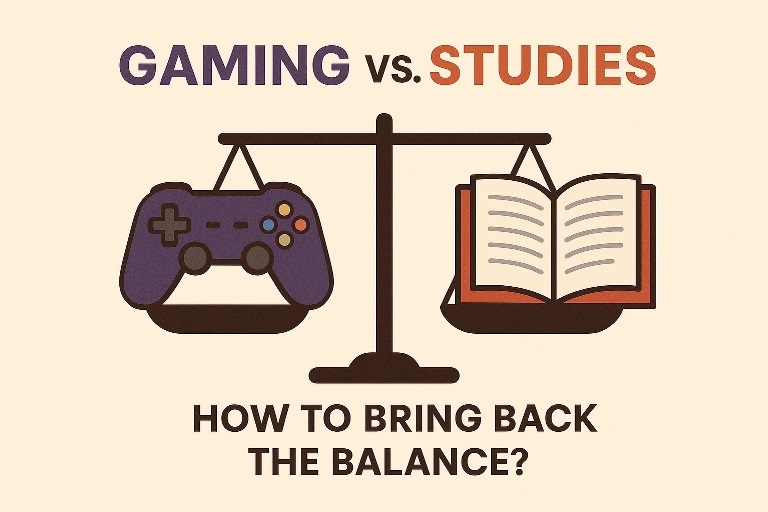Over the last decade, gaming has become one of the most popular activities among students. From mobile games and PC setups to online multiplayer platforms, gaming has evolved into a global industry worth over 200 billion dollars as of 2024. In India, reports suggest that more than 400 million people play online games, and a significant portion of this audience is under the age of 20. While gaming can be fun and even educational in some cases, it is also becoming a major distraction from studies for many students.
Parents often notice that their children can spend hours playing games without feeling tired, yet find it difficult to focus on their homework for even 30 minutes. This is not surprising. Studies by the American Psychological Association have shown that gaming can trigger the release of dopamine, the brain’s “feel-good” chemical, creating a reward loop that makes students want to keep playing. When this habit becomes excessive, it can reduce the time and mental energy available for academic work.
However, the goal should not be to completely ban gaming. Research from the University of Oxford in 2022 found that moderate gaming — around one hour a day — can improve problem-solving skills, reaction time, and even teamwork in multiplayer settings. The problem begins when gaming hours extend beyond recommended limits, leading to reduced sleep, poor concentration, and missed study deadlines.
Finding the right balance between gaming and studies is essential. Here are some practical strategies that have worked for both parents and students:
Set fixed gaming hours: Students should decide on a clear schedule where gaming is allowed only after completing homework or study goals for the day. This creates a sense of reward and discipline.
Use gaming as a break, not a priority: Instead of starting the day with games, use them as a short break between study sessions. This helps refresh the mind without turning gaming into the main focus.
Involve parents in the process: When parents take an interest in what their child plays, it opens communication and helps set reasonable limits without creating unnecessary conflict.
Track screen time: Most devices and apps now have built-in features to track how much time is spent on gaming. Reviewing this weekly can help students stay accountable.
Encourage offline hobbies: Sports, reading, art, or music can serve as healthy alternatives that provide fun and relaxation without screen dependency.
Link gaming with learning: Educational games and simulation-based activities can combine entertainment with skill development, making screen time more productive.
Students must understand that excessive gaming can have long-term effects on academic performance. A survey by the National Institute of Mental Health and Neurosciences (NIMHANS) in India found that students who gamed for more than three hours a day scored significantly lower in exams compared to those who played less than one hour. On the other hand, students who managed their gaming time effectively were able to maintain good grades while still enjoying their favorite games.
The message is simple: gaming is not the enemy, but it must be kept in its place. Studies should always be the priority during school and college years because they shape future opportunities. Gaming can be enjoyed as a reward and a way to relax, but only when balanced with academic responsibilities. When students learn to control their gaming habits instead of letting games control them, they can enjoy the best of both worlds — fun and success.
By Nidhi Mehta – Founder – IndiaTutor.in
To share your Feedback or Review – Contact Us
Are you a Tutor looking for more students? Register your Tutor profile on India Tutor to connect with Students in India and Abroad.
Are you a Student or a Parent Looking for the Right Tutor in India? – Submit Tutor Wanted Form to reach relevant tutors registered on IndiaTutor.in. It is Free!

